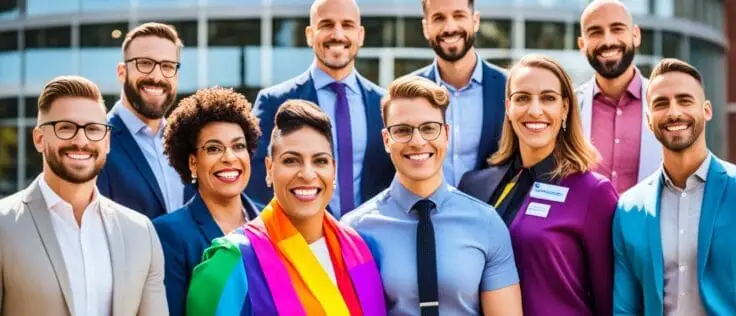Is your company truly supportive of LGBTQ+ employees after Pride Month? Many LGBTQ+ workers, 46%, hide at work. They fear stereotypes, discomfort, or losing friends. Add to that, 31% face discrimination and microaggressions. It shows UK companies must do more for diversity and support all year.
Experts like Latesha Byrd say support for LGBTQ+ staff must last all year. The year 2023 saw over 520 anti-LGBTQ+ proposals, with 220 aimed at transgender and non-binary people. “Real support goes beyond just symbols,” says Byrd. Companies must offer deep, ongoing support for LGBTQ+ rights.
Understanding the Importance of Year-Round Support
Supporting LGBTQ+ employees all year is crucial for a truly inclusive workplace. Celebrating Pride Month is great but it’s not enough. Companies have to go beyond just showing support during Pride. They must make their efforts real and ongoing to tackle the deep-rooted issues LGBTQ+ people face.
LGBTQ+ individuals often face discrimination and prejudice at work. The Human Rights Campaign points out the negative effects on their well-being and job performance. It’s important for companies to actively promote diversity. Supporting LGBTQ+ employees helps in creating a strong environment where everyone can succeed.
For a supportive workplace, companies must take serious steps. They should not only have inclusive policies but also make sure these policies are part of everyday life. Culture Amp shows that focusing on LGBTQ+ rights and support improves job satisfaction and lowers staff turnover.
Supporting LGBTQ+ staff means providing regular training and setting up employee groups. It’s about acknowledging their work and making them feel safe and appreciated all year round. These actions help push diversity forward and keep up a supportive work atmosphere.
Developing Clear Non-Discrimination Policies
Having strong policies is key to a fair workplace. Latesha Byrd says detailed non-discrimination policies protect the company well. They defend against legal issues and damage to reputation. Policies need to explain what discrimination and harassment are. They should give real-life examples and state who is protected.
Details on how to report issues must be clear. It’s important to outline investigation steps and the consequences for offenders, too.
But having these policies isn’t enough. They must be communicated well. Through handbooks, intranets, and DEI portals, employees learn the rules and what happens if they’re broken. It’s also key to train managers and HR with care. They should handle issues with empathy and ensure confidentiality while keeping discrimination out.
Consistent DEI efforts are crucial. Training should cover awareness, prevention, and how to report. Leadership must also know their duties.
If harassment is reported, action needs to be quick and careful. This includes private investigations, supporting victims, and taking disciplinary steps. Steps to stop future problems are also needed.
In the UK, the Equality Act 2010 sets the law for avoiding discrimination. Public bodies have even more duties. Clear policies, their wide sharing, and firm enforcement build a respectful and diverse culture. This leads to a happier and more efficient workforce.
Implementing Diversity, Equity, and Inclusion (DEI) Training
Implementing DEI training programmes is key. It helps us be more understanding and empathetic towards LGBTQ+ identities. This promotes a welcoming environment. These sessions teach about LGBTQ+ awareness, inclusive language, and unconscious bias. It is important for all staff members to attend them.
Companies should work with outside experts and LGBTQ+ groups for these workshops. For example, WorkSpa runs DEI training with top consultants. These can happen online or in-office. They cover many topics like Unconscious Bias and Inclusive Leadership. This broadens how we learn to be more inclusive at work.

DEI training reaches everyone in a company, from new hires to top bosses. This approach is widespread. It makes us more empathetic. It also shows why we should value all team members. This is stated in CIPD’s 2022 report on how important diversity is at work.
WorkSpa also has Anti-Racism Training to help us support each other better. They offer training for those who’ve faced trauma. Plus, they run gender-specific sessions. These tackle the hurdles various genders face. It tells us how necessary it is to support everyone, no matter their gender.
Supporting LGBTQ+ Employee Resource Groups (ERGs)
Today, it’s vital to support LGBTQ+ ERGs in our workplaces. Many LGBTQIA+ folks aren’t open at work, fearing harassment and exclusion. By backing ERGs, businesses can lessen harassment and make work safer for everyone.
ERGs fight for inclusivity and help with professional growth. They offer insights into diversity strategies, improving the workplace for all. This leads to happier, more dedicated workers.
Gallagher’s LGBTQ+ network is a great example of ERG success, with over 100 members in a few years. Surveys show how much employees value this support. It proves how accepting environments boost wellbeing.
Gallagher’s LGBTQ+ group creates a community for sharing and understanding. With depression affecting many LGBTQ+ individuals yearly, such support is crucial. It greatly improves employees’ wellbeing.
Effective ERGs match their goals with their company’s, seek leadership support, and welcome everyone. When ERGs are part of the company’s DEI plans, everyone benefits. It uplifts LGBTQIA employees and enhances company culture.
The rise of anti-LGBTQ+ attacks shows the urgency for supportive workplaces. Leaders should work closely with ERGs, offer resources, and address concerns. This ensures that all employees feel valued and included.
Offering Mentorship and Sponsorship Opportunities
Mentorship programs are key for supporting LGBTQ+ visibility and helping employees move forward in their careers. The CharityComms mentoring program, for example, offers six-month mentoring where mentees choose their mentors. This provides focused support and growth opportunities.
Through these programs, organizational members get special to mentors. This creates a space for sharing knowledge and learning leadership skills. Also, such programs are vital in promoting LGBTQ+ visibility. They guide young LGBTQ+ adults to professional success.
There are many mentorship schemes aimed at charity CEOs, fundraisers, and professionals in creative sectors. NEON gives extra support to teams working in social movements. This how wide the reach of these mentorship programs is.
Mentors usually have five years of work experience or two years post-graduate. They meet mentees monthly for a year. Their training is thorough, ensuring they offer excellent guidance. The training takes just two weeks to complete.
The One NHS Finance Sponsorship programme supports those in under-represented groups. Financed by The Finance Academy, it shows commitment to mentorship and career advancement in finance for LGBTQ+ employees.
Companies are encouraged to start formal mentorship schemes that link LGBTQ+ staff with top leaders. This highlights the achievements of LGBTQ+ employees. By using internal and external media, companies can build a welcoming environment. They show that they value every employee’s input.
Participating in LGBTQ+ Events and Sponsorships
Getting involved in Pride and LGBTQ+ events shows a company’s support for inclusivity. Coca‑Cola began supporting Pride in Great Britain in 2018. Since then, it has increased its help every year. For Pride in London 2023 and Brighton Pride 2023, Coca‑Cola is a key sponsor. The company will have over 100 employees at these events, at places like Trafalgar Square and Preston Park.

This year, Coca‑Cola is also backing EuroPride 2023 in Malta. Its support follows previous years’ outreach at events like EuroPride 2022 in Belgrade and Copenhagen 2021. Such global efforts show the importance of companies being allies, promoting diversity and inclusion everywhere. Coca‑Cola also runs the ‘Breakthrough’ campaign via Coke Studio. It helps unsigned LGBTQ+ musicians in the UK and Ireland gain recognition.
Barclays continues to be the main sponsor of Pride in London for its fourth year. Transport for London (TfL) and over 300 Tesco colleagues will decorate their spaces and join the parade. This shows how company participation in these events is growing. Pride in London will see over 26,500 attendees, with nearly 50 official partners from various sectors.
Companies should talk about their LGBTQ+ event involvement on social media and their websites. GAY TIMES, a top LGBTQ+ publisher, reaches 300 million people worldwide on Instagram and TikTok. This shows how media plays a big role in supporting corporate allyship. Such actions show a company’s commitment to creating a welcoming atmosphere and support inclusivity efforts.
Providing LGBTQ+-Inclusive Benefits
Offering benefits for LGBTQ+ employees shows a deep commitment to their well-being. These benefits include things like parental leave, help with adoption, and finding LGBTQ+-friendly healthcare. This range of support is vital for their inclusion.
Policies that affirm gender identity are crucial. They help by making it easier for employees to change their names and gender markers. They also support people through their transition and offer ways to report discrimination. This approach tackles the mental health issues that stem from discrimination and stigma.
Moreover, mental health support that understands LGBTQ+ needs is key. Inclusive counselling and resources can lower the rates of depression, anxiety, and stress seen in the LGBTQ+ community.
It’s important that these offerings are transparent. Transparent policies ensure they’re seen as genuine. Firms like Clifford Chance, Arup, and Victim Support are leading the way. They are not just talking about LGBTQ+-inclusive benefits – they are actively providing them. This not only makes the workplace better but also meets wider diversity and equity goals.
The aim is to make work a place where everyone, no matter who they love or how they identify, feels supported. By adopting gender-affirming policies and offering good parental leave, companies build a culture of inclusivity. This benefits all employees.
Corporate Support UK: Moving Beyond Performative Actions
In the UK, there’s a push for companies to really show they support LGBTQ+ rights. Just saying they do isn’t enough. They should take real actions to prove it.
One good step is to offer benefits that welcome everyone, like Novartis does. They helped 42 million people in rural India get medicine. UK companies can learn from this. They should adopt policies that respect everyone’s needs.
It’s important to also focus on helping everyone at work succeed. Women still face many challenges in their careers. Firms need to make sure their leaders represent everyone. This helps create fair chances for all.
Working together with others can make a big difference. Jamie Anley supports this idea. These partnerships lead to real changes. They show a company is truly committed.
However, some think companies only act well to look good. They need to really check the good they do. And not just make it look like they are. Paris experts say this needs serious effort.
There’s talk on whether doing good also helps the business. Simon Milton shows it can. He says companies can grow by caring about social issues.
Lastly, UK firms should aim for a welcoming place for everyone, everywhere. Even where laws aren’t supportive. This way, they show true commitment to making things better.
Conclusion
A real effort in corporate diversity goes beyond just looking good. It means truly working to include everyone and acting ethically in business. Making the workplace welcoming and fair for LGBTQ+ employees throughout the year is crucial. This is because it’s both the right thing to do and beneficial for the business. Implementing strong policies against discrimination helps create a safe space for everyone.
Also, it’s important to keep teaching about Diversity, Equity, and Inclusion (DEI). This helps everyone understand and respect different identities. It works to break down harmful stereotypes and fights against unseen biases. By backings groups within the company for LGBTQ+ employees, businesses can make sure these employees have a voice. This encourages a lasting culture of inclusion.
Offering ways for LGBTQ+ staff to get guidance and see a path for their careers is key. It can lift their visibility in the company and inspire others. Getting involved in LGBTQ+ events and offering benefits that matter to all employees shows a company really cares. Taking actions against unfair laws and supporting helpful projects shows a deep commitment to inclusion. These actions not only create a fair workplace but also bring in a variety of talents and ideas. This, in turn, helps the company and everyone who works there succeed.






